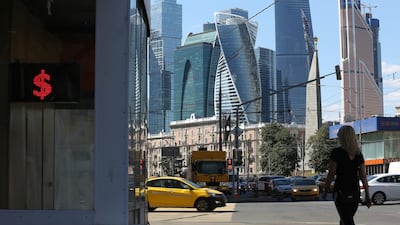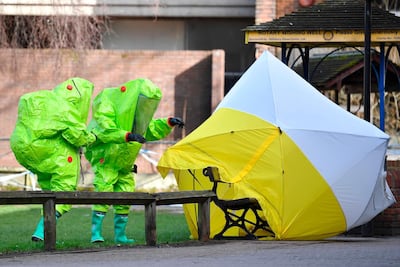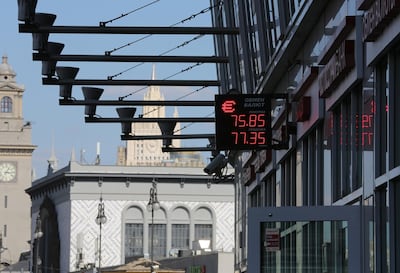Loading up on Russian sovereign bonds was a consensus trade for emerging market investors once Donald Trump won the White House, but the US President's failure to defuse the threat of ever-tighter sanctions has unnerved even the most bullish funds.
Earlier this month, Washington outlined another round of sanctions over Moscow's alleged use of a nerve agent against a former Russian spy in Britain, Reuters said.
They kicked in on Wednesday and if Russia does not permit United Nations inspections within 90 days, a second set of "draconian" measures will follow, according to the US State Department.
Two US senators have also proposed "the sanctions bill from hell" in reprisal for alleged Russian meddling in US elections. This includes limits on trading new Russian government bonds and additional sanctions on the seven largest Russian banks.
Although Mr Trump campaigned on improving relations with Moscow, he has not provided the protection investors hoped for. Already undermined by a rising dollar, a plummeting Turkish lira and wobbling emerging markets, the rouble has plunged to its lowest in nearly two years.
In a response to Mr Trump’s comments that he could ease sanctions if Russia assisted on issues such as Ukraine and Syria, the Kremlin spokesman Dmitry Peskov said Tuesday that they want to know which specific steps the US is seeking in this cooperation.
Almost 700 Russian people and companies are now under US sanctions, according to Bloomberg.
The rouble has retreated about 7 per cent in August, heading toward its worst month since November 2016.
Some investors now fear a repeat of April's jolt, when US sanctions on Russian aluminium producer Rusal triggered waves of selling across all Russian assets.
"We still don't know what's going to happen, but clearly people are selling and asking questions later," said Ed Al Hussainy, senior interest rate and currency analyst at Columbia Threadneedle Investments, which has been reducing Russian rouble treasury bonds, known as OFZs.
"People have been caught a little bit long in Russia because the fundamental story is very good – but people with any kind of memory of 2014 are hitting the sell button," he said. Russia annexed Crimea in 2014, triggering sanctions from the United States, the European Union, Canada and Japan.
Attractive fundamentals such as falling inflation, central bank interest rate cuts and a recovery in the oil price had all encouraged asset managers to go overweight Russian local- currency debt.
And until recently, OFZs have outperformed. Between November 8, 2016, when Mr Trump was elected, and August 14, 2018, Russian local currency bonds returned 10.4 per cent, Reuters said. The JP Morgan GBI EM Global Diversified index lost 1.3 per cent over the same period.
But by August 17, yields on 10-year local government bonds had climbed to 8.7 per cent, the highest since December 2016 .
_______________
Read more:
Russia warns US: sanctions on banks would mean economic war
Rusal's profit rockets despite US sanctions on Russian aluminium giant
_______________
"It is instructive to remember the political risk associated with OFZ investments," said Abhishek Kumar at State Street Global Advisors, citing a fall of 65 per cent from June-December 2014 during the Ukraine crisis.
Foreign investors held 27.5 per cent of Russian treasury bonds at end-July, down from 28.2 per cent a month earlier. Russian rating agency ACRA said overall demand would fall as much as 10 per cent from early 2018 levels if new sanctions were imposed.
The top five foreign holders of OFZs, according to Bloomberg data cited by State Street, are BlackRock, GAM, Stone Harbor Investment Partners, Nikko Asset Management and Legg Mason. The biggest of those, BlackRock, has 1.53 per cent of the total by US dollar market value, with US fund managers accounting for 9.6 per cent.
Paul McNamara, investment director at GAM, said he was still long OFZs "with gritted teeth". If sanctions are applied to new sovereign debt, he said, "It will make the market significantly less liquid, but the probability of something which causes massive forced selling is low".
Raphael Marechal, head portfolio manager, emerging markets, at Nikko Asset Management Europe, said sanctions on new Russian sovereign debt would be "very extreme", seeing a higher risk of measures on energy companies and state-owned banks.
BlackRock and Stone Harbor Investment Partners declined to comment.
Poor summer liquidity, aggravated by a broad-based emerging markets sell-off in early August, means cutting big overweights is tricky.
"Because the whole EM complex is so much weaker, liquidity is exceptionally bad, so offloading EM positions right now is painful," said Mr Al Hussainy, suggesting some managers might wait until September: "If you sell now you crystallise your losses immediately."
Viktor Szabo, senior investment manager, fixed income, at Aberdeen Standard Investments, said Aberdeen remained overweight Russian local debt and the currency: "Obviously that is hurting us, but this is still one of the best stories out there and it should outperform."
Russian five-year credit default swaps are still trading at around 160 basis points, compared with over 600 bps in 2014, perhaps signalling some complacency. Mr Al Hussainy said there would "almost certainly" be more selling if the US imposed more sanctions.
"My experience of emerging markets is that it can always get worse!" he said, pointing out that the Kremlin had drawn a red line over any measures targeting state-owned banks: "We are not priced for additional rounds of retaliation by both sides."




